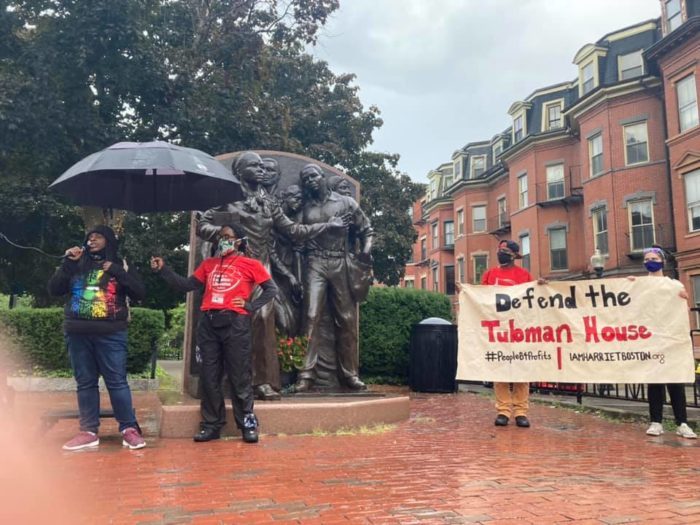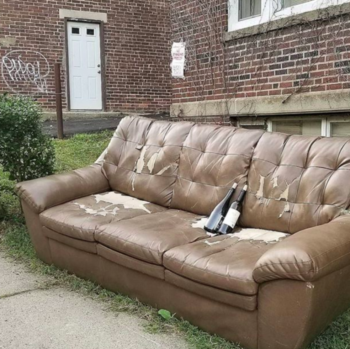
LOCAL
Last Wednesday, demonstrators met up in the South End to protest the impending demolition of the Harriet Tubman House. The property, which sits on the major corner of Columbus Ave and Mass Ave, used to be home for six nonprofit groups, as well as the United South End Settlements—until a developer got his eye on the site.
New Boston Ventures specializes in transforming old buildings into luxury condos and apparently saw dollar signs at a location once dedicated to undoing the harm of 1970s gentrification.
The move incensed local residents and activists who still recall the horrors of urban renewal, which uprooted countless low-income, predominantly Black families in the South End, resulting in the city giving up the property that would become the Harriet Tubman House.
“Mayor Walsh just talked about Boston becoming a leader in racial equity, and you have a historical Black organization who will be kicked out of the Harriet Tubman House.” We spoke with Arnesse Brown of the Tenants Development Corporation prior to the organization having to vacate the Tubman House this month. “This is a great time to show the country that the city of Boston is serious. This house represents the moral sins of urban renewal.”
USES claims that a sale of the building was necessary, as they could not afford to make needed repairs to the building. The organization also said that selling the building will save them about $300,000 a year on maintenance costs, which will allow for the expansion of their cash-generating daycare programs.
 STATE
STATE
Is Allston Christmas canceled this year?
If so, what does it mean for the region’s continuing housing crisis?
Every year on Sept. 1, people from across the state hit the streets of Allston (as well as Mission Hill, Cambridge, and other obvious spots like Amherst, Worcester, and Fitchburg, if you’re an expert dumpster-diving antique hunter) with trucks for the annual move-in clusterfuck known as Allston Christmas. Students make up a significant portion of our population, and so a whole lot of apartments start new leases after August.
But what happens when it still is not clear how many students will actually return? To what extent did quarantine hinder apartment hunting, which typically starts as early as February? What impact will the potentially pending flood of evictions have after the end of the state’s moratorium? And, ultimately, how will this all impact housing availability and affordability?
“I’ve been looking at housing for 35 to 40 years,” said Barry Bluestone, founding dean of Northeastern University’s School of Public Policy and Urban Affairs. “This is the first time I have felt uneasy about making any projections or forecasts.”
Many universities are considering going entirely or at least partially virtual, meaning that fewer students will have to endure high rents in the city when they can stay in the suburbs. Bluestone also noted that remote learning and work has spurred an influx of new full-time residents to Cape Cod, with other remote pockets of the Bay State also considered by reformed city-dwellers.
“Landlords who have a personal connection with renters are less likely to jack up the rents,” MassLandlords Executive Director Douglass Quattrochi told DigBoston. “Corporate renters don’t know anyone’s name.”

NATIONAL
From coast to coast, it will now be easier for developers and communities to ignore racially discriminatory housing trends thanks to United States Department of Housing and Urban Development Secretary Ben Carson’s move to repeal the Affirmatively Furthering Fair Housing rule established in 2015.
The measure, which is no longer in effect, required cities and towns that receive federal aid for housing to determine if there are any racial or economic barriers that contribute to unfair housing and then formulate a plan to address those deficits. In July, Carson complained that the Obama-era rule was unreasonable, saying it is “ultimately a waste of time” for municipalities to comply. The secretary also claimed the rule contributed to funds being steered away from communities that really need them, ostensibly because it was too difficult to ensure federally mandated fair housing standards.
“Washington has no business dictating what is best to meet your local community’s unique needs,” Carson said while promoting the new rule at an Aug 20 press event.
The Trump administration’s updated guideline will give communities that allow for or even encourage housing discrimination the “benefit of the doubt” when it comes to assessing whether there is a problem. The president recently said the quiet part out loud on Twitter when he proclaimed that he would protect suburban homes from having to exist near subsidized housing.
“I am happy to inform all of the people living in their Suburban Lifestyle Dream,” Trump wrote, “that you will no longer be bothered or financially hurt by having low income housing built in your neighborhood.”
Zack is a veteran reporter. He writes for DigBoston and VICE, and formerly reported for the Boston Courant and Bulletin Newspapers.

